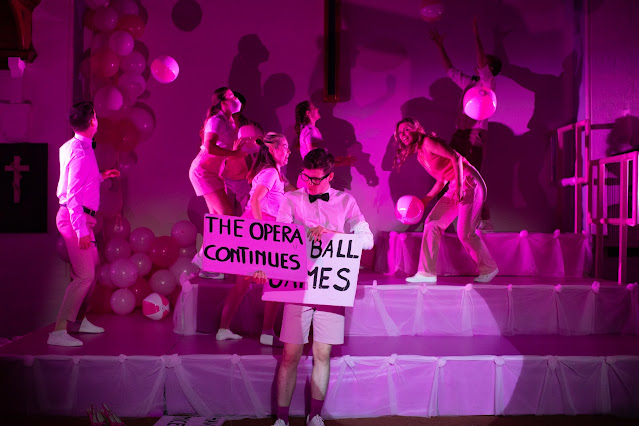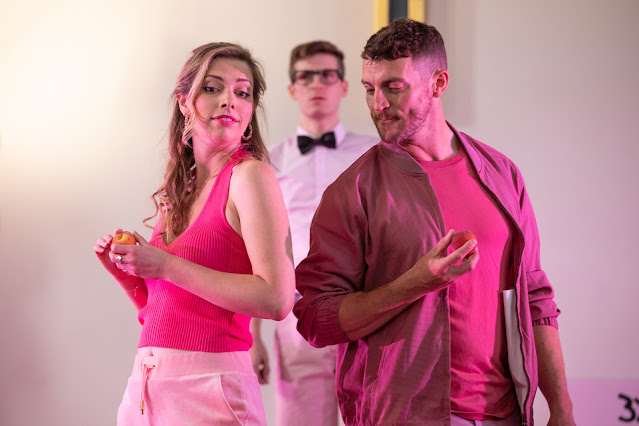 |
| Britten: Albert Herring - Alex Akhurst, Owain Gwynfryn & ensemble - St Paul's Opera (Photo Ali Wright) |
Britten: Albert Herring; Alex Akhurst, Rosalind O'Dowd, Jenny Samuel, Patricia Ninian, Robert Byford, Peder Holtermann, Ross Fettes, Owain Gwynfryn, Alexandra Dinwiddie, Deborah Holborn, director: Annemiek van Elst, St Paul's Sinfonia, conductor Panaretos Kyriatzidis; St Paul's Opera at St Paul's Church, Clapham
Reviewed 9 July 2022
My local opera company returns for its Summer production, an engaging performance of a highly imaginative take on Britten's Albert Herring
St Paul's Opera is my local opera company based at St Paul's Church, Clapham. Co-founded in 2013 by soprano Patricia Ninian, who is the artistic director, the company presents an annual Summer opera as well as events throughout the year. This year's opera was Britten's Albert Herring, which was presented in a fully staged production on 8 and 9 July 2022, preceded on 7 July 2022 by a cover performance with piano. The casting was a mixture of students, early career singers and more mature ones, some of whom were familiar from performances such as Fulham Opera's (now Regents Opera) fine production of Richard Strauss' Die ägyptische Helena. In the past St Paul's Opera productions have used chamber arrangements of the accompaniments, but here they used Britten's full orchestration.
St Paul's Opera presented Britten's Albert Herring at St Paul's Church, Clapham (seen 9 July 2022) in a production directed by Annemiek van Elst with Panaretos Kyriatzidis conducting the St Paul's Sinfonia (based at St Paul's Church, Deptford). Rosalind O'Dowd was Lady Billows, with Jenny Samuel as Florence Pike, Patricia Ninian as Miss Wordsworth, Robert Byford as Mr Gedge, Peder Holtermann as Mr Upfold, Ross Fettes as Superintendent Budd, Owain Gwynfryn as Sid, Alexandra Dinwiddie as Nancy, Alex Akhurst as Albert and Deborah Holborn as Mrs Herring. Costumes were by Karen Elliott, movement by Rachel Wise.
I have seen quite a number of productions of Albert Herring ranging from Scottish Opera to Glyndebourne (original 1985 production and a revival, plus the touring company) to English Touring Opera to Buxton Festival and the Grange Festival, and each of these took an essentially naturalistic view of the comedy, presenting it as observational with the characters creating comedy because they do not realise they are funny.
 |
| Britten: Albert Herring - Ross Fettes, Robert Byford, Patricia Ninian, Deborah Holborn, Jenny Samuel, Rosalind O'Dowd, Alex Akhurst - St Paul's Opera (Photo Ali Wright) |
Van Elst took an entirely different approach. She used a sort of Brechtian theatre to comic and satirical effect. This was very knowing comedy with plenty of stylised movement and in the first scene, in particular, a tendency for the set pieces to be done as routines. Perhaps the funniest and most imaginative was the list of unsuitable candidates for May Queen being given as a sort of beauty pageant, each candidate appearing with their number only to flip the card over to reveal the 'sin' that disqualified them. There was also an acknowledgement that of the sort of theatrical space we were in, there were cards marked applause, and for Lady Billows' two main entrances we were instructed to stand and Rosalind O'Dowd's Lady Billows would thank us and gesture for us to sit.
There was no set, as such, just a flexible platform, and everything (sets and costumes) was in shades of pink, from Lady Billow's magenta-hued frock and hat to Albert's socks, and everything in between. Apart from the realistic food for the feast (the cakes looked genuine), there were no props, just pieces of card (pink) with writing on, such a heavy box of apples!
The cast was larger than usual. To the normal 13 singing roles, there were extra children and a small chorus that acted as supers, manipulated the stage and then joined in the ensembles from the Threnody to the end, effectively making it the whole community that Albert rebels against. Van Elst seems to see Albert as an everyman figure, not someone who is different and her article in the programme book was titled 'There's a little bit of Albert in all of us'. She brought this out by giving Albert four young supporters/doppelgangers (played by performers from the covers cast) who commented on his thoughts and egged him on. Unusually for a modern production, Van Elst was not interested in quite what Albert got up to, nor with whom, for her it was the sheer fact of his rebellion that was important. And at the end, Albert simply walked off down the church's aisle, to a new life.
 |
| Britten: Albert Herring - St Paul's Opera (Photo Ali Wright) |
I have to confess that I was not sure about Van Elst's approach, at first, and certainly the first scene in Act One seemed to have slightly too many ideas, but as the work progressed Van Elst's direction seemed to gain momentum and the final act was very powerful indeed.
It helped that in Alex Akhurst, they had a very personable and believable Albert. Only 23, he created a young, rather nerdy character and the way he kept re-arranging the contents of the shop gave him a slightly obsessive air. For much of the opera Akhurst's Albert was a neutral background onto which the rest of the characters projected their desires, and part of the production's interest was the way Albert gathered a sense of his own character.
Rosalind O'Dowd's Lady Billows was an equally striking, highly created character. Hyacinth Bucket-like, O'Dowd projected Lady Billows' sense of importance and societal role as arising less from noblesse oblige as from her own sense of her importance. As a result she was frequently unintentionally funny. A brilliant conception, only slightly marred by the fact that her words did not carry.
The St Paul's Sinfonia was placed stage left (with piano and percussion stage right), and they gave a fine performance indeed. But in the resonant church acoustic voices were sometimes challenged. The balance favoured the orchestra and not every singer managed the knack of getting words over. O'Dowd is a lyric soprano, on the lighter side for Lady Billows; her performance was musically impressive, but this is an opera that is as much verbal as musical. There were similar problems with the scenes with the town elders, much of the verbal comic business rather evaporated.
However, Jenny Samuel made a finely self-assured Florence Pike, a housekeeper who gave as good as she got. The four town elders were rather treated as a Greek chorus, individual performances being subsumed into an ensemble. Patricia Ninian twittered delightfully as Miss Wordsworth, whilst Robert Byford was a wonderfully oleaginous Mr Gedge who was handsy both with Miss Wordsworth and Superintendent Budd. Peder Holtermann almost made the tiresome Mr Upfold engaging, though an edge in Holtermann's voice made Upfold rather sharp at times. Ross Fettes used his substantial bass-baritone voice to fine effect, giving the Superintendent (in his luridly bright pink outfit) a strong presence. Deborah Holborn was less controlling than some Mrs Herrings, but no less demanding and Holborn brought some delightful detail to her portrayal.
 |
| Britten: Albert Herring - Alexandra Dinwiddie, Alex Akhurst, Owain Gwynfryn - St Paul's Opera (Photo Ali Wright) |
One of the advantages of the production was the characters were largely cast from singers of the right sort of age, so Sid and Nancy were the young and engaging Owain Gwynfryn and Alexandra Dinwiddie. Gwynfryn's charming chancer Sid was perhaps less of a wide-boy than usual whilst Dinwiddie's Nancy was warmly sympathetic, and pair's scenes together were a total delight.
The young children, Emmie, Cis and Harry were all cast from young female singers, and Isabella Roberts, Megan Baker and Olivia Lewis were a manic delight as the three children.
Under conductor Panaretos Kyriatzidis, we had a fine performance indeed from the 12 players of the St Paul's Sinfonia, reflecting the fact that this is less of an orchestral score than a series of virtuoso instrumental lines. Kyriatzidis rather gave the players their head in the ensembles, and whilst the sound was terrific this led, as I have said, to balance issues. That said, this was fine performance indeed and one of which both orchestra and opera company should be proud.
Britten's Albert Herring is no small undertaking and St Paul's Opera's achievement was extremely significant, both in artistic and organisational terms. This was a highly imaginative production that made the best of the rather limited facilities that St Paul's Church offers and clearly engaged a local audience as not only was the church full but many people took advantage of the format of the evening to picnic in the churchyard too. I look forward to what the company does next.
Never miss out on future posts by following us
The blog is free, but I'd be delighted if you were to show your appreciation by buying me a coffee.
Elsewhere on this blog
- Style and substance: a fascinating & engaging account of The Yeomen of the Guard at the Grange - opera review
- Growing up with Hildegard: Voice trio on the importance of Hildegard of Bingen's music to them alongside contemporary pieces - interview
- Gareth Wilson & choir of Girton College, Cambridge return to the richly textured music of Marc'Antonio Ingegneri for a second disc on Toccata Classics - record review
- Beyond the Garden: Developing an Opera, composer Stephen McNeff explores how he and librettist Aoife Mannix developed their new opera - feature article
- Evoking the Ancien Régime: grandeur & imagination in Jean-Joseph de Mondonville's Grands Motets - record review
- Added depth: Julien Van Mellaerts & James Baillieu mix Die schöne Müllerin with the poems not set by Schubert, read by Christopher Purves, to remarkable effect - record review
- Arun Ghosh's The Canticle of the Sun at the Spitalfields Music Festival - concert review
- New ways of working: composer Andrew Chen has two contrasting pieces at this year's Cheltenham Music Festival - interview
- Unsung Heroines: Lauren Fagan & Opera Holland Park Young Artists in a celebration of women composers and more - concert review
- An exciting rediscovery: Mercadante's Il proscritto proves far more than a museum piece in this thrilling revival from Opera Rara - opera review
- An afternoon delight: Anna Morrisey's inventive production of Rossini's The Barber of Seville at Nevill Holt Opera, in a finely musical performance conducted by Dinis Sousa - opera review
- Poetic drama & real musicality: highly imaginative Rusalka from Jack Furness at Garsington with Natalya Romaniw as a compelling water nymph - opera review
- Home











No comments:
Post a Comment